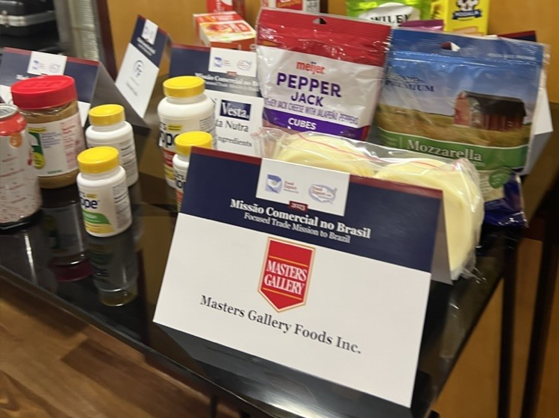Interview with Nicolas Rubio, Agricultural Director of the Agricultural Trade Office (ATO) in São Paulo
By Luana Pinheiro
In his second stay to Brazil, Nicolas Rubio says he is surprised by the evolution of Brazilian agribusiness and is impressed with the entrepreneurial vision of producers
It was a Wednesday, May 26, 1824, when then American President James Monroe recognized the Empire of Brazil as an independent country. The action initiated diplomatic relations between the two countries, but it was only in 1905, with Brazil already a Republic, that commercial relations gained a definitive momentum with the constitution of the two embassies in friendly territories. Joaquim Nabuco, an abolitionist politician born and raised at the Massangana Sugar Mill, in the State of Pernambuco, was the first Brazilian diplomat in American lands. Since then, the link between the two countries has gone through ups and downs, but agribusiness was always an essential component. Currently, there is a clear interest on both sides in strengthening the partnership both with an increase in the flow of products already transacted and through new options. “We have many unexplored opportunities for complementarity both from the United States to Brazil and vice versa,” says Nicolas Rubio, US Agricultural Trade Office Director in São Paulo, in an admirable Portuguese. The father of two daughters, he is his second stay in Brazil. The first was in Brasilia, as attaché to the US Embassy. The current one is in São Paulo, from where he leaves to see all of Brazil. Altogether it’s more than six years following Brazilian agribusiness, a period in which he was surprised by the incessant search for productivity improvement by farmers. These are some of the reasons that make him an enthusiast of the relationship between both countries. “As agribusiness powers, we must lead the initiatives to prevent hunger on the planet. We need to work together to ensure that the food supply reaches its final point,” he said.
RURAL – This is your second stay in Brazil. In your visits to the countryside, what most caught your attention?
RUBIO – I was very surprised by the evolution of Brazilian agribusiness. The entrepreneurial vocation of producers and the search for increased productivity through better agricultural practices are clear. It is also very interesting to see how Brazilian and American producers have in common an awareness of the importance of using technology in the field.
RURAL – Are there any crops in which the use of technology stands out as a differential?
RUBIO – It draws attention the technological application in the soybean crop, in which Brazil is achieving a productivity equal to or even higher than the United States. Corn is on the way. Its production has almost doubled in the last ten years and there is still room for improvement. Although the Brazilian producer is committed to bringing innovations to the field, there are opportunities for the evolution of genetic improvements in seeds and the use of big data in some areas of the country
RURAL – How does the United States evaluate the Brazilian animal protein industry?
RUBIO – Brazil is one of the largest meat producers in the world and there is still room to grow, to increase productivity. The rancher could be even more efficient. We have closely followed a work that Embrapa has been doing that looks at precisely this issue. An ongoing cooperation action between the two countries is to introduce to the producer here the American genetics that could be imported into Brazil. In the milk area, we have been doing an exchange program, taking Brazilian producers and veterinarians to the United States to get to know our production chain and technology.
RURAL – How are the two countries working to improve this bilateral trade?
RUBIO – There is a committee dedicated to working on these opportunities right now. And, in fact, we have great possibilities to improve both the flow of goods that already takes place and to create opportunities with new products.
RURAL – Can you give examples?
RUBIO – California wines and Kentucky spirits are products that Brazilians, when they go to the United States, take advantage of and whose trade is still small. Another import opportunity for Brazil is the hops to be used in the production of craft beer, a market in rapid expansion.
RURAL – What about the opportunities for the Brazil-United States axis?
RUBIO – There is a lot of room for Brazil to increase exports to the United States. We already import a lot of coffee, but there is a demand for nuts. And even for meats. Only now is Brazil starting to export fresh meat. The two countries can complement each other with products well accepted by both sides.
RURAL – Where do these opportunities collide to the point of becoming impossible?
RUBIO – To reach another level, it is necessary to reduce the cost of trade, facilitate the market and adopt more favorable regulatory practices for bilateral trade.
RURAL – Which costs are the most expensive for transactions?
RUBIO – The famous Brazil cost, one of the first things I learned when I got here, has a very heavy weight. There are many unnecessary bureaucratic issues such as the need for double certifications, to carry out several tests for the same purpose. The current Brazilian fiscal scenario also harms the exporter a lot.
RURAL – There is an important issue of American barriers to Brazilian products that nee??d examples
RUBIO – We have to consider that Brazil exports far more agricultural products than it imports from the United States. It is almost US $ 4 billion against just over US $ 1 billion. There are no barriers for the Brazilian producer. The American market has been open for the import of Brazilian fresh meat since 2017. We’ve had some problems, but this was resolved and imports are increasing. As for sugar, we work with import by quotas and Brazil, in addition to being the second largest beneficiary, had an increase in volume this year. On our side, we are disappointed with the Brazilian Government’s stance on ethanol. In 2017 a quota was established that would be valid for two years. Last year we managed to increase it, but we hope that the quota will be abolished this year, so that Brazil and the United States continue to set an example of a free market for the world.
RURAL – The world was surprised by the Covid-19 pandemic. How do you see agribusiness after the biggest health crisis in recent years?
RUBIO – Unfortunately I don’t have a crystal ball. We are living day to day. But one thing that we have already noticed in conversations with American and Brazilian farmers is a high resilience. Despite the problems that the pandemic brought, there was no interruption in the Brazilian productive chain and the sector registered records of production and exports. The same has happened in the United States. We are able to serve all markets that depend on food imports. But, in my opinion, looking ahead, the US-Brazil partnership will be very important to continue promoting agricultural policies based on science. In addition, for the economy to recover, it is necessary to be sure that markets will remain open, with the partnership between countries maintained, and that the rules are transparent.
RURAL – There is a plan of the American administration to increase soy exports to China, but the relations have tensed up. How is the United States solving this issue?
RUBIO – This is an area that we are monitoring very closely. Within our bilateral agreement, soy is extremely important. Let’s see the evolution of China’s demand for that commodity.
RURAL – Another uncertain agreement is that of Mercosur and the European Union. One of the points of disagreement is the environmental issue, at a time when the Brazilian Government has not contributed to the good perception of the country. What is your assessment of the position of the European bloc?
RUBIO – It is important to say that within the European Union there are divergent opinions about Brazil and Mercosur. I have been following the work done by Embrapa and other institutions for years to ensure compliance with all required standards. The European bloc has rules that none of our countries agree with, such as the Maximum Residue Limit (MRL), which has higher limits than recommended by the Codex Alimentarius (FAO), and this impacts business. The United States and Brazil are working together to make sure these decisions are based on science.
RURAL – There is worldwide dissatisfaction with the Brazilian Government’s stance on deforestation in the Amazon. How does the United States view the problem?
RUBIO – What I can say is that the Brazilian producer takes care of the land, the productivity, and obeys the Forest Code. In several farms that I visited here, there is respect for the area destined to the preservation of the natural biome. This commitment does not happen in the United States.
Fonte: Dinheiro Rural


